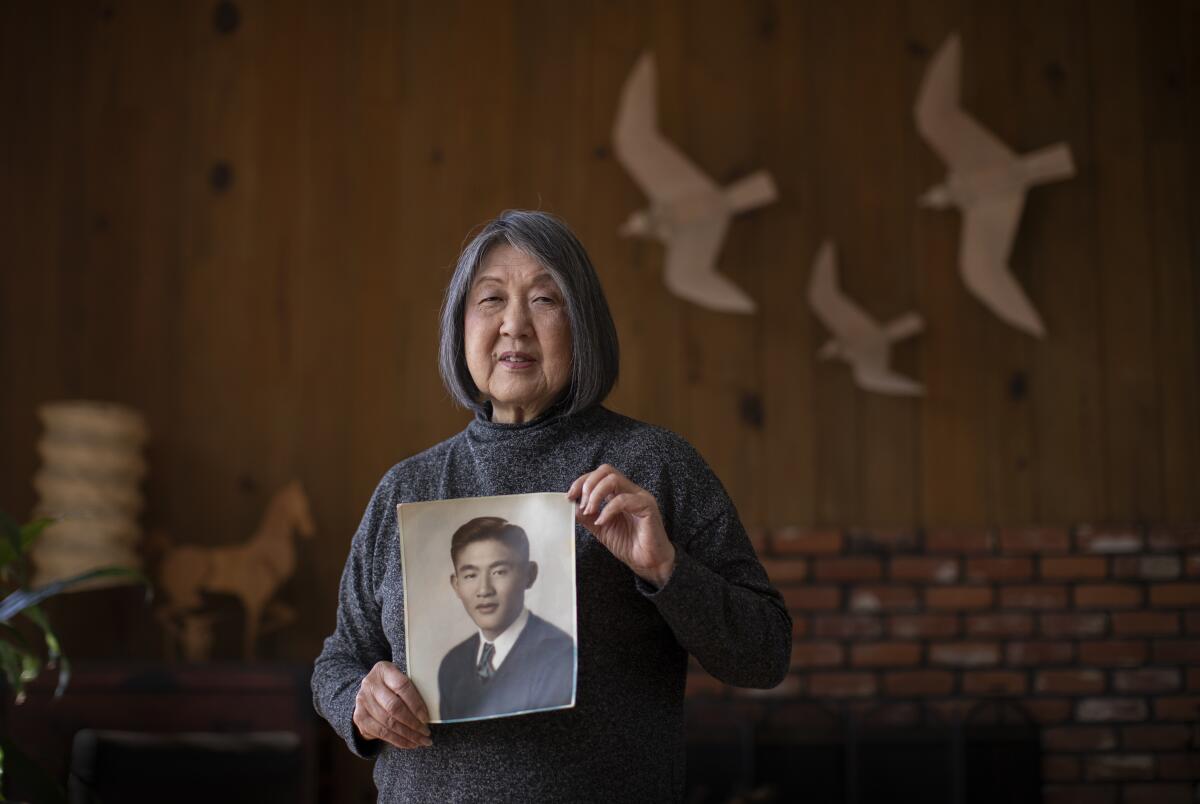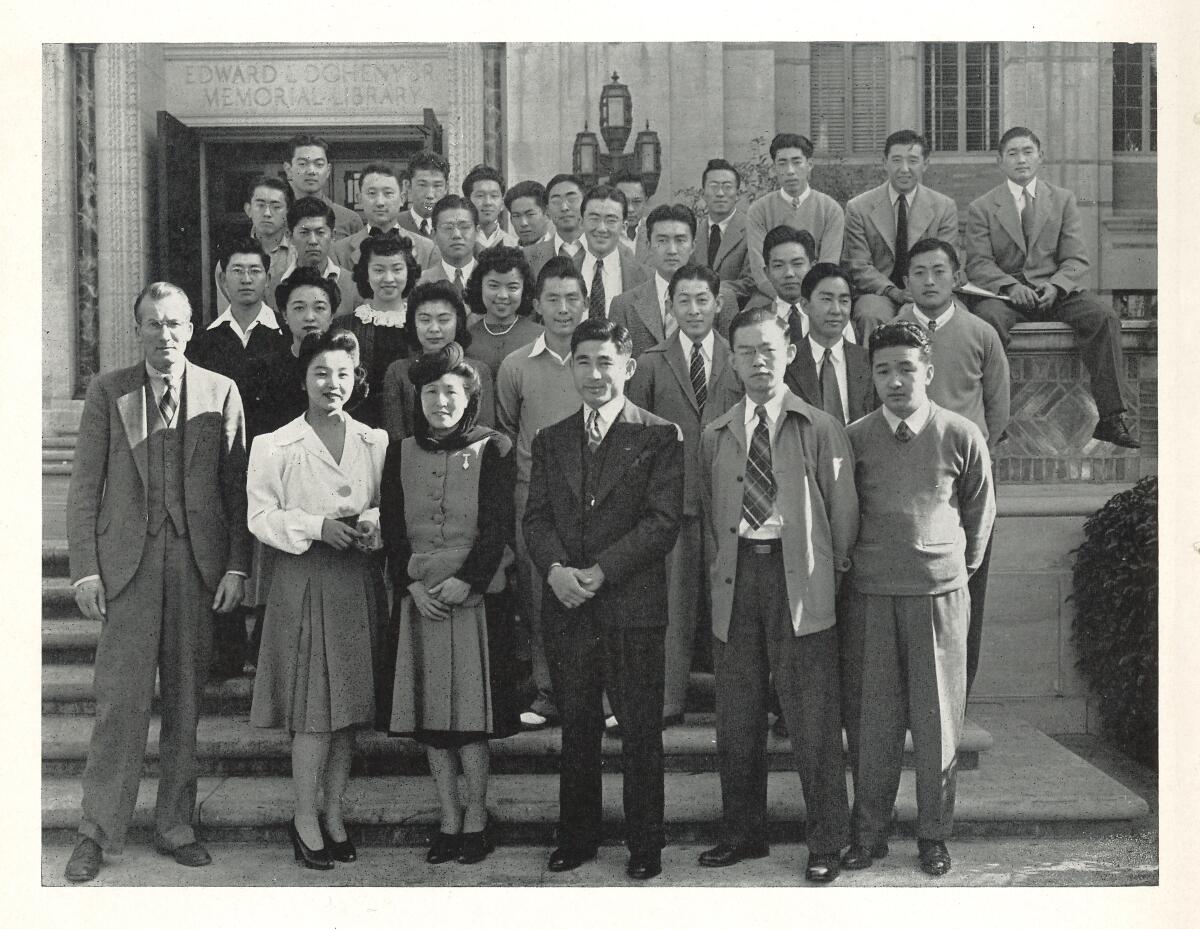USC to apologize for WWII actions that derailed education of Japanese American students

- Share via
In the throes of World War II, weeks after a 1942 presidential executive order forced the removal of all persons of Japanese ancestry from the West Coast, then-UC Berkeley President Robert G. Sproul sprung into action.
He sent an impassioned letter to university presidents across the country, asking them to accept his displaced students, most of them U.S. citizens and “excellent” scholars. Other major West Coast universities joined, including the University of Washington and Occidental College, to assist an estimated 2,500 Japanese American students.
There was one glaring exception: USC.
Then-USC President Rufus B. von KleinSmid — now disgraced for his legacy of eugenics support, antisemitism and racism — and other campus officials refused to release transcripts of Japanese American students so they could study elsewhere. When some students tried to reenroll after the war, USC would not honor their previous coursework and said they would have to start over, according to their surviving family members.
Nearly 80 years later, USC is reversing course. President Carol Folt will publicly apologize to the former Japanese American students on behalf of the university and award them honorary degrees posthumously. The university is asking the public for help locating the families of about 120 students who attended USC during the 1941-42 academic year.
The decision comes nearly 15 years after Japanese American alumni first demanded their alma mater atone for its past behavior.
“This is a stained part of our history,” said Patrick Auerbach, USC associate senior vice president for alumni relations. “While we can’t change what happened in the past ... the university can certainly still do right by their families and let them know that we are posthumously awarding them honorary degrees so that they can occupy that place in the Trojan family, which they deserve.”
Auerbach said USC has long had a policy against awarding honorary degrees posthumously, but that Folt recently directed that an exception be carved out for the Japanese American students.
Since taking the helm in 2019, Folt has addressed several of USC’s troubling legacies on race and equity, including racial profiling by campus security officers, treatment of underrepresented students and Von KleinSmid’s past — leading her to direct that his name be removed from a prominent campus building.
Folt will offer the apology and confer the degrees at an Asian Pacific Alumni Assn. gala next April and acknowledge the recipients at the university commencement in May, USC officials said.
Surviving children of the former students — most, possibly all of them deceased — said their parents would have been thrilled by the honor.

Joanne Kumamoto said her father, Jiro Oishi, was a fourth-year student in business who only needed to take his finals to earn his degree when Japan bombed Pearl Harbor in December 1941. Oishi was picked up by law enforcement in what turned out to be a case of mistaken identity and sent to a federal penitentiary in Montana, missing his exams. He was not allowed to take his finals or complete his degree, returned to Los Angeles after the war, and started over as a gardener, Kumamoto said.
Yet he never expressed bitterness toward USC and, until his death nearly two decades ago, was a lifelong Trojan fan and football and basketball season-ticket holder. He would bring the family to games and tailgate parties, bedecked in his cardinal and gold sweatshirts, polo shirts and caps. Kumamoto said he didn’t disclose his past until she was in high school.
“I’m happy for my dad; he would have appreciated this,” Kumamoto said. “But I also feel sort of bittersweet. He might have had an easier life if he had a degree.”
USC’s decision also satisfied two leading advocates for an apology and posthumous degrees: Jonathan Kaji, who began pushing for action in 2007 as president of the Asian Pacific Alumni Assn., and Lon Kurashige, professor of history and spatial sciences. Kaji helped prod USC to take small steps over the years, including giving the former students honorary alumni status in 2008.
But pressure mounted to do more after a 2009 state law required that California State University and California Community Colleges award honorary degrees to all displaced Japanese American students, living or deceased. The University of California also lifted its moratorium on such degrees and conferred hundreds in 2010.
USC finally agreed to grant honorary degrees in 2012, but only to living students — nine of whom received them amid a sustained standing ovation at commencement ceremonies that year.
Kaji and others were rebuffed in demands for a full apology and posthumous degrees to all students.
“This should have been resolved long ago, but Dr. Folt has a better understanding of the particular trauma these families have endured for too long,” Kaji said. “In light of the wave of anti-Asian violence ... USC’s action sends a message throughout the Trojan family and community at large that until historical inequities are correctly addressed, there can’t be progress in our society.”
The issue began picking up steam on campus after George Floyd’s murder last year prompted many universities to scrutinize their own racist legacies. USC law students Mirelle Raza, Sara Zollner and Jenna Edzant publicized the issue in a research project, “Forgotten Trojans,” and an Academic Senate committee also advocated for the cause.
George Sanchez, the Senate committee’s co-chair, said the USC apology and degree conferral were just the first step in the university’s reckoning process. A major issue, he said, is USC’s continued lack of transparency about its decisions. Unlike most major research universities, it does not allow access to its presidential papers without permission from the current president — and access remains blocked despite years of faculty requests, he said. Georgetown and Yale, for instance, have fully opened their archives to allow scholars to plumb their past involvement with slavery.
Sanchez said he was told by the university archivist that Von KleinSmid’s papers no longer exist in the archives and he is unsure how they disappeared. As a result, the role Von KleinSmid played in adopting the hard line against Japanese American students may never be fully known.
Roger Daniels, a University of Cincinnati emeritus professor of history who has extensively researched the Japanese American incarceration experience, has documented the hostility of the USC dental school dean toward the students and said Von KleinSmid believed that aiding them would “give comfort to the enemy” even though they were U.S. citizens.
Regardless of documentation, USC officials say they believe the stories of how the university impeded its former students’ pursuit of education during the war.
For the most part, their family members say there are no hard feelings. Laurie Inadomi-Halvorsen said her father, Yoshiharu Inadomi, was a USC sophomore in the spring of 1942 when he and his family were forced to leave their Fillmore home in Ventura County for incarceration in a desolate camp in Gila River, Ariz. He eventually was released to attend Drake University in Iowa and graduated with a degree in business.
Like many other Japanese American Trojans, he never lost his loyalty to USC. A former Trojan marching band member, Inadomi became a football season-ticket holder after he returned to Los Angeles and rarely missed a game, his daughter said. Although it’s “heartbreaking” that her father could never graduate from USC, she said, she was able to do so in 1983 — and he was there to witness it.
“It’s pretty incredible that they’re recognizing what was done,” she said. “It makes me proud I graduated from USC.”
More to Read
Sign up for Essential California
The most important California stories and recommendations in your inbox every morning.
You may occasionally receive promotional content from the Los Angeles Times.











